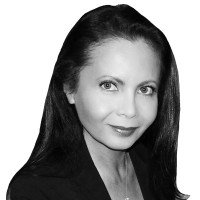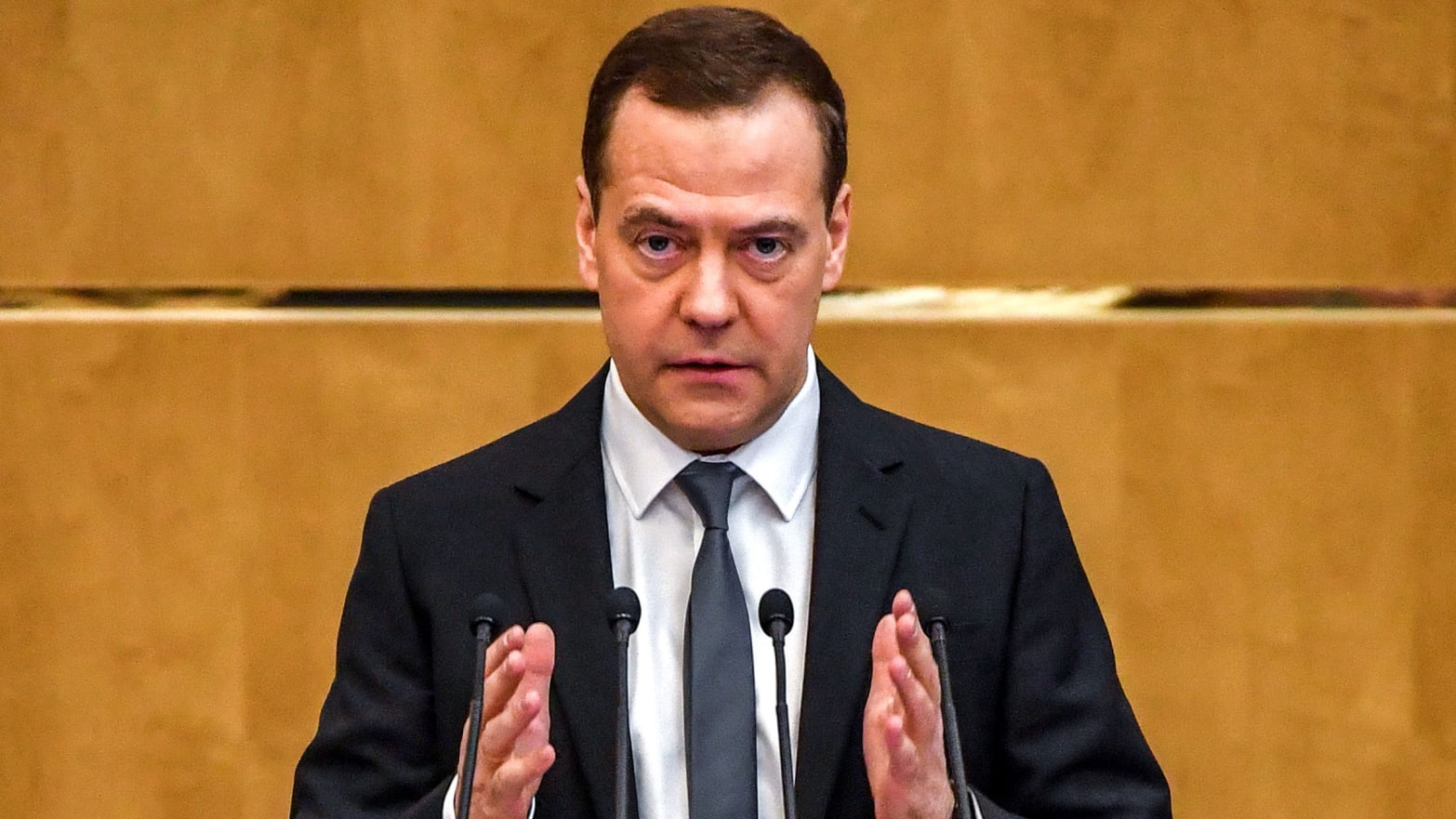At a celebration of the Russian Orthodox New Year on Tuesday, Prime Minister Dmitry Medvedev chose a grim message, the sarcasm of which left his audience on edge. But, then, Medvedev probably knew what Wednesday would bring—the resignation of his entire government—and the audience did not.
On national television, the prime minister read at length from Anton Chekhov’s story "A Night in the Cemetery," which suggests with ironic wit that celebrating the coming of the New Year is a foolish pursuit, unworthy of a properly functioning mind, since “every coming year is as bad as the previous one,” and the newest year is bound to be even worse. Instead of celebrating the New Year, Chekhov wrote—and Medvedev read—one should suffer, cry and attempt suicide. Every new year brings you closer to death, makes you poorer, your bald spots larger and your wife older, he said.
Medvedev’s sour greetings brought on some awkward laughs and sparse applause from confused Russian bureaucrats in the studio audience, most of whom remained stone-faced. The prime minister seemed nervous and almost dropped his papers at the end of the speech.
Then Wednesday dawned, and Russian President Vladimir Putin in his annual state of the nation address proposed a constitutional overhaul. It supposedly is designed to boost the powers of parliament and the cabinet, but more likely is intended to give Putin, 67, a firm grip on the country for many more years, even decades, to come.
A few hours later, Medvedev submitted his resignation, and his entire cabinet submitted theirs as well. And while some of them may stay on, Medvedev, who once served a term as Putin's placeholder president, will move to a previously nonexistent post.
Putin offered the prime minister slot to Mikhail Mishustin, the head of the Russian Tax Service, who has been described as “the taxman of the future,” digitally acquiring receipts of every transaction in Russia within 90 seconds.
It's unclear whether Mishustin will be a placeholder technocrat or assume other responsibilities currently known only to Putin. But in his annual address, Putin articulated the need to identify any persons with current or former double citizenships and foreign holdings, eliminating them from government service. Mishustin might become instrumental in such a reshuffling of Russia’s power elites, who are perceived to be unpatriotic by maintaining residences or bank accounts abroad. The added pressure will also give Putin further leverage over them.
In the past, Putin and Medvedev have choreographed moves that allowed Putin to remain in charge under different titles, swapping places to circumvent term limits.
This time around, Medvedev will assume a newly created position as the Deputy Chairman of the Security Council and all current ministers will remain in an acting capacity until a new government is appointed.
Meanwhile, the leader of Chechnya in Russia's volatile North Caucasus region, Ramzan Kadyrov has declared himself to be “temporarily incapacitated,” relegating his duties to the current prime minister of Chechnya, Muslim Khuchiyev.
Putin’s sweeping changes are widely interpreted as designed to weaken his successor, reshaping Russia’s power structure in order to create additional opportunities for Putin's continued control over the government, even after the conclusion of his fourth presidential term in 2024.
Putin proposed amending the Russian constitution to expand the powers of the legislative branch and investing additional powers in the State Council, leading to speculation Putin is contemplating his future return at the helm of a newly empowered Parliament, after the expiration of his current presidential term.
Commentary on the Russian president’s likely intention to carve out a new position for himself has been skillfully avoided by the Russian state media. Instead, Kremlin-controlled news outlets chose to focus on promised subsidies for families with young children, designed to address Russia’s demographic crisis by boosting the birth rate, and the general claim that Putin has, as it were, made Russia great again.
On the Russian state television show, The Evening with Vladimir Soloviev, the host proclaimed, “The greatness of the country is indisputably tied to the name of Putin.” Soloviev argued that the Russian president “restored respect” towards their country globally.
His take was echoed by the State Duma Deputy Chair Irina Yarovaya, who pontificated that Putin, having achieved his foreign policy and national security objectives, could now move on to his domestic agenda. Yarovaya said, “We remember statements by [U.S. President Barack Obama] in 2014—very recently—that Russia is a regional power of minor importance. We remember all of that. We remember how the sanctions started. We remember how we weren’t invited to the G8. And today there is a line of world leaders waiting just to talk to our president over the phone…”
The sanctions started and Russia was disinvited after it seized and annexed the Ukrainian peninsula of Crimea in 2014, then incited and abetted a separatist war in Ukraine's east. They were intensified after Russia's flagrant interference in the 2016 U.S. presidential elections.
Russian state media also highlight Putin’s promises of socioeconomic largesse and his prediction that “Russia's economy will grow faster than the global average in 2021.” During the last decade, the Russian leader has promised in vain that Russia will become the world’s fifth largest economy by 2024. It is currently ranked as the 11th largest economy in the world, with a smaller GDP than that of California.
President Putin’s current growth prediction is much more modest. It’s still not realistic, but such promises had to be made as Russia’s declining standards of living have led to political unrest and mass protests.
Without providing any direct answers as to his own plans, the Russian leader—who has now been in power for 20 years—created new venues for his continued reign in yet-to-be-revealed future capacities.
Amid all the uncertainties, maybe it shouldn’t surprise us that Medvedev was reading Chekhov’s story about a blind drunk civil servant who stumbles out of a New Year’s celebration only to get lost in a graveyard—and then discovers in the morning he was somewhere else entirely.

